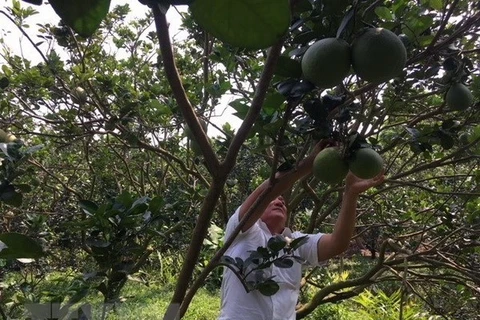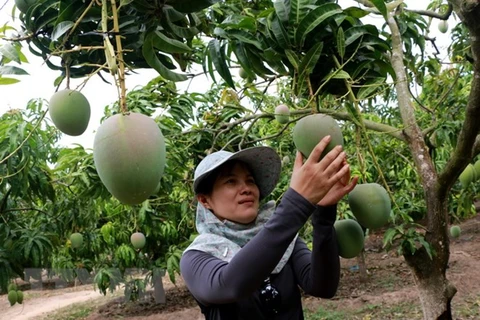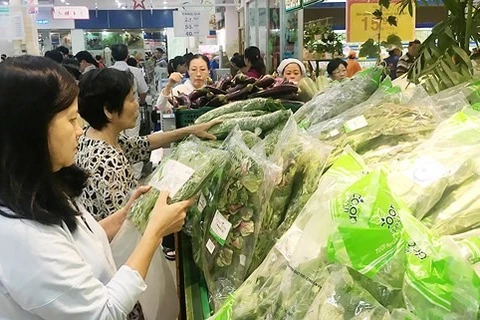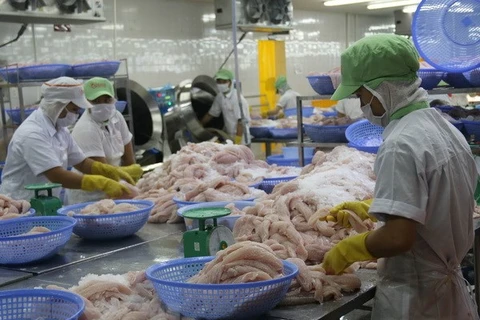HCM City (VNS/VNA) - Good agricultural practices and food safety certification are the first requirements for agricultural producers who want to export or sell to international retail chains, experts have said.
They were speaking at a conference titled “Overcome the technical barriers for food and agricultural products to export to EU” in HCM City on August 17.
Vietnam is still among the countries whose exports are rejected by European markets mainly because of food safety issues.
Last year, the EU’s rapid alert system for food and feed (RASFF) issued 77 notifications that Vietnamese exports had not qualified for import and 23 shipments were rejected at the border.
In the first half of this year, the figures were 36 and 11.
Marieke Van Der Pijl, legal consultant of the Food, Agri and Aqua Business Sector Committee of the European Chamber of Commerce in Vietnam, said the main reasons for rejection included detection of antibiotics, crop protection products and other harmful chemicals, cold-chain breaks during transportation which increase the chances for bacteria to develop.
Other reasons included the lack of traceability, insufficient food and farm produce testing results and failure to meet sanitary and phytosanitary requirements.
She said when an export was rejected, not only was the exporter affected but there was also a bigger consequence: harm to the reputation of Vietnamese products threatening their competitiveness on the international market.
Therefore, domestic producers should keep in mind that food safety was vital to enter the EU market and maintain customer loyalty since “once the trust is broken, it is very hard to get it back,” she said.
Nguyen Huy, food manager in Vietnam for global quality certification agency Bureau Veritas, said before 2015 fishery products accounted for most food safety alerts from the RASFF about Vietnamese consignments.
But now, there was an increasing number of notifications on farm produce since exports of Vietnamese agricultural products had risen rapidly in recent years.
He said to gain access to Europe and ensure consistent quality of exports to the market, producers should adopt the EU’s food safety standards.
He said one of the most popular certifications in Europe is the BRC Global Standard for Food Safety developed by food industry experts.
It provides a framework to manage product safety, integrity, legality and quality, and the operational controls for these criteria in the food and food ingredient manufacturing, processing and packing industries.
Other standards such as BAP (Best Aquaculture Practices) and especially Global GAP (Good Agricultural Practices) are also favoured in European markets, and in fact have become quite popular among Vietnamese agricultural and fisheries producers.
“If producers adopt Global GAP, they will have a better chance of gaining access to the European market as they can speak the same language with European importers.”
Huy said one of the common features of these standards is the traceability of products since in demanding markets like Europe, consumers are highly aware of the products they consume, especially food.
“The tracing of product origin has to go from farm to middlemen to processors and until the packaging and labelling stage.”
Pijl said rules of origin would also be a criterion if Vietnamese exporters seek tax benefits when exporting to European markets once the Việt Nam – EU Free Trade Agreement (EVFTA) comes into force.
“It’s good news that many Vietnamese food products have geographical indications such as Moc Chau tea, Buon Ma Thuot coffee and Hoa Loc and Chu mangos. This will help the products be exported easily to foreign markets.”
According to experts at the conference, the EVFTA, likely to be ratified by the end of this year, will also bring the pressure of competing with European companies in Vietnam.
Nguyen Kim Thanh, an expert from the High-quality Vietnamese Goods Business Association, said the livestock industry would face fierce competition as a result of the EVFTA and other free trade agreements.
She said if local producers cannot up their game by adopting food safety control systems to produce high-quality products that meet international standards, they could easily lose their market to imports.-VNS/VNA
























